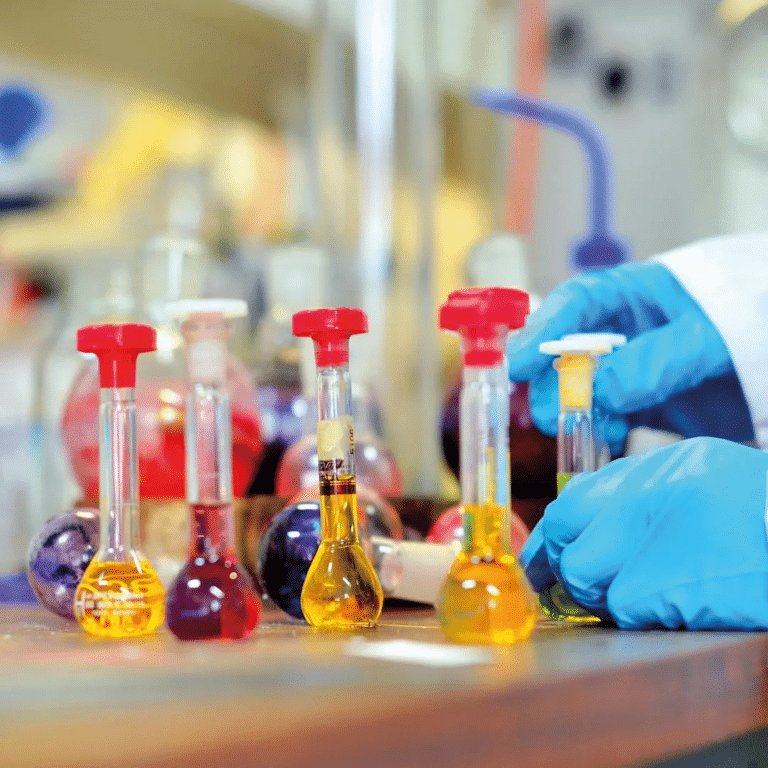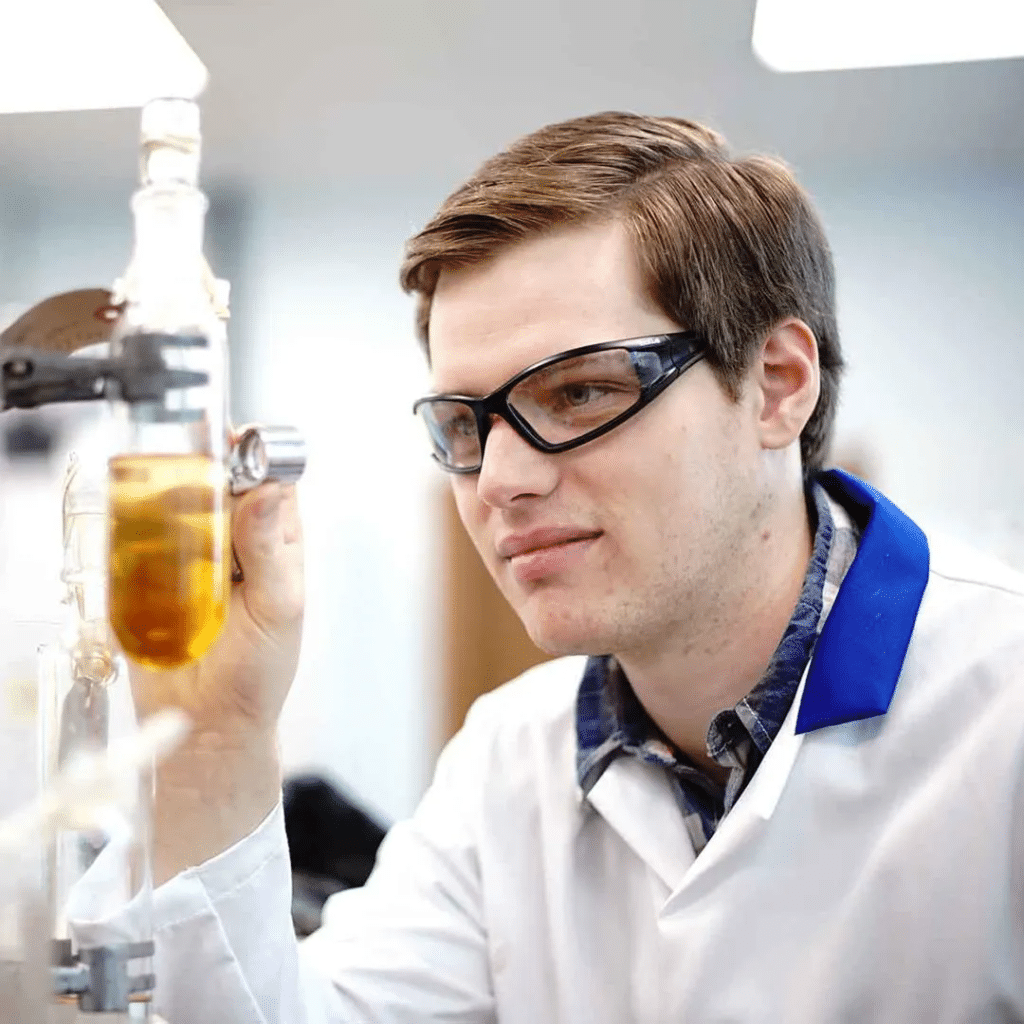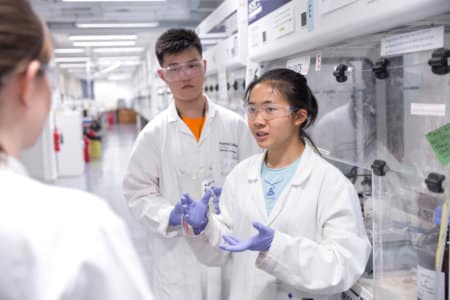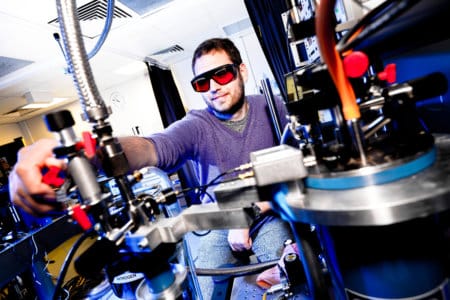
Chemistry is the driving force that allows us to transform raw materials and chemicals into the products that enrich our daily lives. From the food and drink we consume to the makeup we apply, from life-saving medicines to the energy that fuels our existence and the materials that clothe, propel, and power our world, these are borne and powered by knowledge of how properties, composition, and structure of substances work. Chemists are arguably the architects of modernity.
Fused with the know-how to apply science to the optimum conversion of the resources of nature to the uses of humankind, chemical engineers use both disciplines to get to the forefront of scientific and technological developments. They design, construct and operate processes to create products that we all depend on and are often tackling some of the world’s most pressing problems.
Studying chemistry or chemical engineering can get you far — especially if you have a degree from a top UK university. This is because it signals to employers that you’ve learned from experts, applied knowledge to the real world and know your way around state-of-the-art facilities. Here are four UK universities that do just that:

Chemistry at the University of Hull is a hands-on subject with excellent career prospects. Source: University of Hull
University of Hull
To thrive in a chemistry career, you first need a dynamic and hands-on degree — the kind offered by the University of Hull. It’s based in a bustling city that’s a few miles inland from the east coast of England, close to some of Britain’s loveliest countryside as well as expansive coastlines. But it gets better still for chemistry students — Hull is a region rich with chemical companies, including industry giants like BP, Total, Reckitt, Phillips 66, Croda, and Smith & Nephew. Having one of the largest chemical industry clusters in the UK at your doorstep not only leads to lots of scope for placements but also makes it much easier for you to connect with professional scientists.
It’s all part of the university’s “Career-ready guarantee.” A Hull degree makes you a more inspired, more experienced, and more employable graduate. And the university ensures this for chemistry students by pairing them with industry mentors and helping them progress to a career with major companies. Still, that’s not all. The BSc (Hons) Chemistry and MChem Chemistry are accredited by the Royal Society of Chemistry as well, putting you on track to Chartered Chemist (CChem) status. The latter has a master’s degree integrated into the BSc — this means in your fourth year, you will join a research project full-time for four to five days a week.
These programmes cover analytical, forensic, inorganic, organic, and physical chemistry, with modules on materials chemistry, spectroscopic methods, computational chemistry and many others. As a graduate, you’ll be equipped with a broad, balanced knowledge of the various subjects that make up modern chemistry — opening up various career pathways to you. If you want to advance your knowledge in modern instrumentation and in novel methods of chemical and forensic analysis, you can join the MSc in Analytical and Forensic Chemistry. It’s run by the university’s Analytical Science Group, one of the UK’s premier analytical groups, with a range of state-of-the-art facilities and instrumentation.
To celebrate the 50th anniversary of its pioneering work in liquid crystals, the university is offering up to 20 George W Gray Scholarships — worth 9,000 pounds a year — to study chemistry at Hull in honour of the chemist who pioneered this world-changing discovery. Click here to learn more about Chemistry at the University of Hull.

UEA’s School of Chemistry aims to provide a modern and innovative learning experience for its students. Source: University of East Anglia/Facebook
University of East Anglia
Established in 1963, the University of East Anglia (UEA) is ranked in the UK Top 30 by The Times University Guide 2023 and 27th in The Guardian University Guide 2023. Its Faculty of Science is one of the largest faculties at the institution. Within this faculty lies seven schools of study that provide an intellectually challenging learning experience within a supportive educational environment. Among them is the School of Chemistry — founded over 50 years ago and is passionate about providing a modern and innovative learning experience.
While chemistry serves as the foundation of their work, the School of Chemistry at UEA prides itself on being a cross-disciplinary institution. It explores the intersections between chemistry and various other scientific domains, including biology, physics, and analytical science. Here, students can tailor their courses to match their interests, gaining skills and experiences that prepare them for future careers.
Programmes offered here include BSc (Hons) Chemistry, BSc (Hons) Medicinal Chemistry, MSc Advanced Organic Chemistry, MChem Chemistry with a Year Abroad, and more. Whichever programme you choose, you’ll benefit from a close-knit community, allowing you to collaborate closely with leading researchers. The school’s faculty boasts expertise and experience in organic synthesis, catalysis, biological chemistry, and chemical physics.
What sets the School of Chemistry apart is its affiliation with the Norwich Research Park, a hub of innovation housing pioneering companies and organisations. As a student here, you’ll enjoy access to state-of-the-art teaching laboratories, world-class research opportunities, and dedicated faculty members, all contributing to an ideal learning environment.

Imperial College London’s Department of Chemical Engineering started offering undergraduate courses in 1937. Source: Imperial College London/Facebook
Imperial College London
Ranked first among Russell Group universities for research impact, Imperial College London is home to a Department of Chemical Engineering that works with industry powerhouses to create solutions with immediate, real-world impact. Think reducing carbon emissions, developing clean energy technologies and infrastructure, and producing innovations in healthcare — their research interests range from the molecular to the mega-scale.
The Department of Chemical Engineering first offered undergraduate courses in 1937, making it one of the oldest, most experienced chemical engineering divisions in the UK. Its integrated four-year degree programme is the first in the country to fulfil the most recent Engineering Council MEng requirements too. The course combines core foundation subjects, design, specialised modules, sometimes a year abroad, and of course, laboratory work.
To graduate chemical engineers who will continue Imperial’s legacy of solving the world’s greatest challenges, the college offers students unlimited access to state-of-the-art facilities — all of which are leveraged alongside a cadre of highly-skilled technicians.
Students can carry out hands-on research in Imperial’s bespoke undergraduate teaching laboratory. They have access to the Analytical Services laboratory which houses a suite of major analytical instruments. Then there’s the futuristic carbon capture pilot plant. Stretching over four floors, it is the only facility in the world that teaches undergraduates the ins and outs of running a plant.
Spaces like these are just one of the reasons why Imperial Chem Eng is consistently rated as one of the leading departments in the UK and the world for research in chemical engineering or why student satisfaction at Imperial is now at 90%.

Surrey’s School of Chemistry and Chemical Engineering brings together chemistry and chemical engineering – creating unique opportunities in teaching and research. Source: University of Surrey/Facebook
University of Surrey
Surrey’s School of Chemistry and Chemical Engineering is the only school of its kind at a university in England. It brings together two closely linked disciplines — chemistry and chemical engineering — which means students gain a broad overview of the chemical industry and the opportunity to specialise in a field that fascinates them.
Ranked in the UK top 20 by the Complete University Guide 2023, Surrey’s chemistry and chemical engineering degrees boast high student satisfaction — 93% of chemistry students said they were satisfied with their course in the National Student Survey 2022.
Here, students can pursue undergraduate BEng (Hons)/MEng degrees in Chemical Engineering, Chemical and Petroleum Engineering, and BEng (Hons)/MChem degrees in Chemistry, Chemistry with Forensic Investigation and Medicinal Chemistry.
Surrey students benefit from innovative teaching methods, industry-standard facilities, high staff-to-student ratios and excellent personal support. Its tutorial system ensures that you’ll have timetabled one-to-one sessions every week with your tutor. This is when you can talk through any topics you find particularly challenging.
As Surrey’s courses emphasise “learning by doing,” expect extensive lab work as well as team and individual projects during your time at this university ranked #13 in the UK. Forming a central part of its chemical engineering courses, its 1.7 million pounds Fluor pilot plant — one of few facilities of its kind at a UK university — enables students to experience the entire chemical process in an industry-standard environment. Chemistry students benefit from the many advanced laboratories where they work closely with academics and technicians in small groups as well.
Across the school, teaching integrates the latest technological advancements. For example, students use virtual reality software to familiarise themselves with chemical engineering processes before setting foot in the physical plant. With such features, it’s little wonder Surrey’s chemical engineers are thriving in high-growth sectors such as pharmaceuticals, energy, food, and water and waste management.
*Some of the institutions featured in this article are commercial partners of Study International









